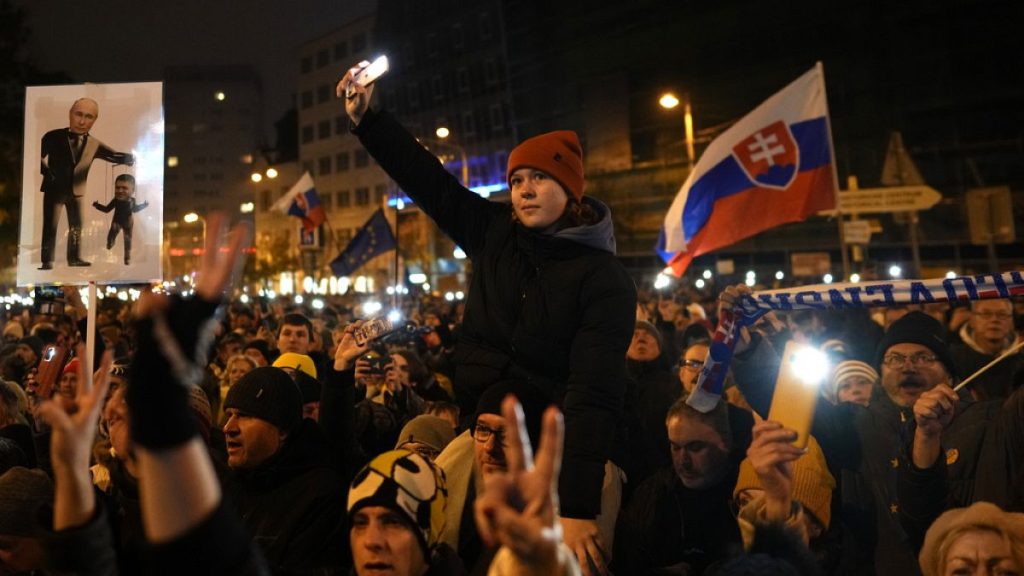The political landscape of Slovakia has been embroiled in controversy following Prime Minister Robert Fico’s visit to Moscow and his subsequent pronouncements regarding aid to Ukrainian refugees and the disruption of Russian gas supplies. On Friday, thousands of Slovakians took to the streets of Bratislava to protest Fico’s perceived pro-Moscow stance, expressing anxieties about the country’s alignment with Russia amidst the ongoing war in Ukraine. The demonstrations underscore the deep divisions within Slovak society regarding the nation’s foreign policy orientation and its relationship with both Russia and the European Union.
The catalyst for the protests was multifaceted, stemming from a confluence of recent events. Fico’s meeting with Vladimir Putin in Moscow on December 22nd, 2023, raised concerns about the nature of the discussions and the potential for Slovakia to become a conduit for Russian influence within the EU. This meeting, occurring against the backdrop of Russia’s ongoing war in Ukraine, made Fico only the third EU leader to meet with Putin in Moscow since the full-scale invasion began in February 2022. This act, coupled with the threat to curtail financial assistance to Ukrainian refugees residing in Slovakia, further fueled public discontent. Fico’s suggestion that aid could be withdrawn in retaliation for Ukraine’s decision to halt the transit of Russian gas through its territory was perceived by many as a move that prioritized political maneuvering over humanitarian concerns.
The demonstrations in Bratislava were marked by a strong pro-European sentiment, with participants waving EU and Slovak flags and carrying signs proclaiming “We are Europe” and “Treason!” This display of pro-EU sentiment reflects a desire to maintain close ties with Europe and resist any perceived alignment with Russia. Many protesters voiced fears that Slovakia was drifting away from its Western alliances and becoming increasingly susceptible to Russian influence. The public expression of dissent underlines the significance of European integration for a segment of Slovak society and their apprehension about the perceived erosion of democratic values and principles.
The gas transit dispute further complicates the situation. Ukraine’s refusal to renew a pre-war transit deal with Gazprom, the Russian state energy giant, effectively halted the flow of Russian gas through Ukrainian pipelines to Slovakia. While Slovakia has historically relied heavily on Russian gas, Ukraine’s decision stems from its unwillingness to facilitate Russia’s energy trade amidst the ongoing conflict. President Zelenskyy’s refusal to renew the transit agreement reflects Ukraine’s determination to resist what it perceives as Russian exploitation of its resources and infrastructure. This decision, however, has placed Slovakia in a difficult position, potentially impacting its energy security and economic stability.
Fico’s response to the gas supply disruption has been met with criticism. His suggestion of retaliatory measures, including potentially cutting electricity supplies to Ukraine and demanding financial compensation, has further exacerbated tensions. Critics argue that these proposed actions demonstrate a lack of solidarity with Ukraine and a willingness to prioritize Slovakia’s economic interests over the broader geopolitical context. Furthermore, the threat to reduce aid to Ukrainian refugees has been widely condemned as a cynical political move designed to deflect attention from Fico’s own controversial actions.
The protests and the ongoing gas dispute highlight the complex web of geopolitical and economic factors shaping Slovakia’s current political landscape. Fico’s pursuit of closer ties with Russia, his controversial statements regarding Ukrainian refugees, and the disruption of Russian gas supplies have created a volatile situation with significant implications for both domestic and international relations. The demonstrations underscore the deep divisions within Slovak society and the growing unease over the direction of the country’s foreign policy. The future trajectory of Slovakia’s relationship with Russia, Ukraine, and the EU hangs in the balance, with significant ramifications for the region’s stability and security. The protests serve as a potent reminder of the challenges faced by nations navigating the complex dynamics of international relations in a time of heightened geopolitical tensions.














